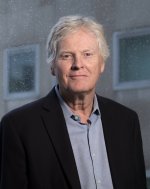Genes controlling sleep and circadian rhythms
to

Michael W. Young, Ph.D.
Richard and Jeanne Fisher Professor, Head of the Laboratory of Genetics
Vice-President for Academic Affairs
The Rockefeller University
In the late 1970s, Dr. Young began to use the fruit fly, Drosophila melanogaster, to explore the molecular bases of circadian rhythms, the daily behavioral and physiological cycles observed in most organisms. Molecular and genetic screens in his laboratory identified six genes that are involved in the formation of a biochemical oscillator with a periodicity close to 24-hours. Interactions among these genes, and their proteins, contribute to a network of molecular oscillations that emerge within most tissues at the level of single cells. Most of the clock genes discovered by Dr. Young and his colleagues in Drosophila melanogaster are also central to the circadian pathways of vertebrates.
Along with colleagues Jeffrey C. Hall and Michael Rosbash, Dr. Young received the Nobel Prize in Physiology or Medicine (2017) for discoveries of molecular mechanisms controlling circadian rhythms. In addition, Drs. Young, Hall, and Rosbash also received the Gruber Neuroscience Prize (2009), Horwitz Prize (2011), Canada Gairdner International Award (2012), Massry Prize (2012), Wiley Prize (2013), and Shaw Prize (2013).
Dr. Young’s research has been supported continuously by NIH and NIGMS since 1975, when he was awarded a postdoctoral fellowship. He also receives research support from the NINDS.
Summary
Dr. Young’s laboratory has identified genes that control the circadian rhythms of Drosophila melanogaster. Interactions among these genes and their proteins set up a network of oscillations within single cells. These oscillations are autonomously generated, are found in most tissues, and establish rhythms in physiology and behavior. This mechanism is conserved within the animal kingdom: similar clock genes regulate patterns of sleep and other rhythms in humans. A common form of human insomnia called Delayed Sleep Phase Disorder (DSPD) is characterized by a persistent and intractable delay in the timing of the major sleep episode. A study of several DSPD subjects allowed Dr. Young’s laboratory to recognize a specific clock gene variant that affects behavioral, physiological, and molecular circadian rhythms of carriers under controlled laboratory conditions. The lab’s results are consistent with the candidate allele encoding a dominant, hyperactive transcription factor that alters sleep and circadian rhythms by lengthening the period of the circadian clock
This page was last updated on Wednesday, August 11, 2021